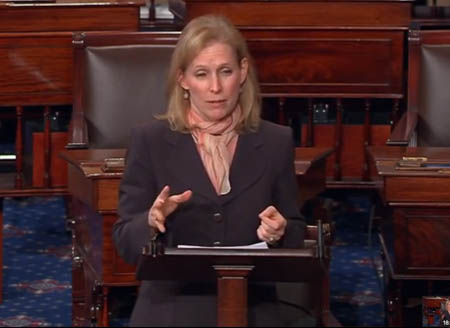
Nov. 21, 2013—Senators have introduced a host of competing amendments to the Fiscal 2014 defense authorization bill aimed at curbing sexual assaults in the military.
Sen. Kirsten Gillibrand (D-N.Y.) and a bipartisan team of senators released a letter Nov. 19, signed by 26 retired generals, admirals, commanders, and other military leaders supporting an amendment that if approved would remove commander’s power to make decisions about cases involving sexual assault and instead give that authority to an independent prosecutor.
“As a former commander, endorsing a change that removes certain authority from military commanders has been a tough decision,” retired Air Force Maj. Gen. Martha Rainville, the first woman in the National Guard to serve as state adjutant general, was quoted as saying on Gillibrand’s website. Rainville was one of the retired generals to sign the Nov. 19 letter.
Her decision, she says, was “driven by my conviction that our men and women in uniform deserve to know, without a doubt, that they are valued and will be treated fairly with all due process should they report an offense and seek help, or face being accused of an offense.”
Senate Majority Leader Harry Reid (D-Nev.) tweeted Nov. 19 that he publicly supports the legislation.
However, Defense Department spokeswoman Army Lt. Col. Catherine Wilkinson
told the Daily Report there are several “misperceptions about the role of the commander.” For example, she said, “Commanders do not investigate [military sexual assault crimes]; that is the job of independent military criminal investigators.” She added that it is the commanders who are “responsible” for setting and enforcing standards. “They lead by example. We need to have commanders more involved, not less involved, in this process,” she said.
Wilkinson said the independent panel set up by Congress to study how US allies’ combat military sexual assault found no evidence that removing a commander from the decision making process had any affect on the reporting of sexual assaults.
Meanwhile, Sen. Claire McCaskill (D-Mo.) continues to push for a competing bill, which would remove the commander’s ability to change or dismiss court-martial convictions in cases of sexual assault. However, McCaskill’s amendment does not completely remove commanders’ authority over sexual assault cases.
Back in June, Sen. Kelly Ayotte (R-N.H.) authored, along with Sen. Patty Murray (D-Wa.), legislation that would provide sexual assault victims a trained military lawyer to guide them throughout the legal process.
DOD announced a 46 percent increase in sexual assault reports on Nov. 7, however, Wilkinson attributed the increase to a growing confidence in DOD’s response system.
“Together, our increase in reports—with commanders more involved—and the lack of evidence from our allies that their removal can affect an increase in reports make a compelling argument to keep the chain of command involved in sexual assault prosecutions.”
(See also Debating the Debate Process and Plague of Sexual Assaults)

